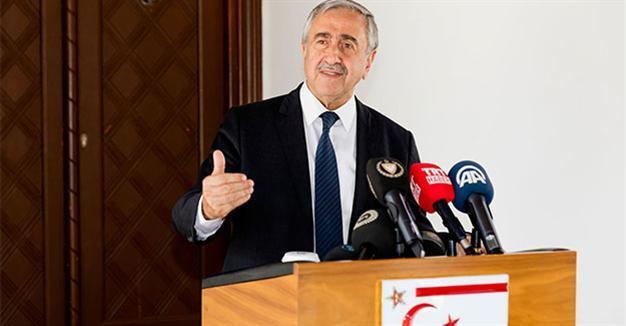Cyprus deal possible in 90 days: Akıncı
NICOSIA

AA photo
A peace deal can be reached on Cyprus within 90 days if both sides of the divided Mediterranean island are willing and decisive about the issue, Turkish Cypriot leader Mustafa Akıncı has said.
“We have come to a point where the willpower, political courage and decisiveness factors weigh more heavily than the time factor. If there is will and decisiveness then 90 days is enough [to reach a peace deal on the island],” Akıncı said in a televised interview on Sept. 15 in response to a question on whether Greek Cypriot President Nicos Anastasiades would take a possible resolution to his nation, according to a transcript of the interview published on the Turkish Cypriot Presidency’s website on Sept. 15.
Akıncı added that out of the total of six negotiation chapters, a consensus was reached in most of the topics under four chapters, while the remaining two chapters - Security and Guarantees, and Territory – would not take up as much time as the Governance and Power-Sharing, and Property chapters. Ninety days would therefore be enough to reach the long-anticipated deal.
Akıncı comments on Anastasiades’ social media post Akıncı said his Greek Cypriot counterpart had engaged in an effort to prepare his side for a possible resolution on the island, citing a recent Facebook post by Anastasiades.
“There was a statement [by Anastasiades] on Facebook. There were very bold remarks. He was able to express some things [topics] that was not pronounced previously and that he had also not said,” Akıncı said. “But we need to see if it will continue. We will see this within 90 days.”
The eastern Mediterranean island was divided into a Turkish Cypriot state in the north and a Greek Cypriot state in the south after a 1974 military coup aimed at unification with Greece was followed by the intervention of Turkey as a guarantor power.
Efforts to find a peaceful solution to the more than 40-year-old conflict were relaunched after previously failed peace talks were opened once again in May 2015 following the election of Akıncı as the new president of Turkish Cyprus.
On Sept. 14, speaking after the final meeting of a series of intensified meetings between Akıncı and Anastasiades, the U.N. Secretary-General’s special Adviser for Cyprus Espen Barth Eide said the two sides were committed to reaching a peace deal before the year ends, but gaps on controversial issues remained.
Akıncı and Anastasiades are scheduled to meet U.N. Secretary-General Ban Ki-moon on Sept. 25 in New York in a tripartite meeting, while the United Nations General Assembly will be held.
‘Turkey, Greece talking over Cyprus peace deal’Akıncı said negotiations would continue after the meeting in New York with Ban and the multi-partite conference, including the guarantor states, would be hold in a later and unspecified date.
“The foreign ministers of Turkey and Greece are talking. These talks will enhance in New York [during the General Assembly]. [Turkish President Recep Tayyip] Erdoğan and [Greek Prime Minister Alexis] Tsipras will also meet. Eide went to Athens [recently] and held a meeting with Tsipras for one-and-a-half hours, and he met with [Greek] Foreign Minister [Nikos] Kotzias for three-and-a-half hours. Greece is now involved in the process,” he added.
Akıncı reiterated that the peace process negotiations should reach an end in 2016 as there were many risks in 2017. He said the last months of 2016 were crucial, referring the start of searches for natural gas reserves, the presidential elections in the Greek Cypriot administration set for 2018, and the United States presidential elections in November, after which U.S. President Barack Obama, who supports the Cyprus peace process, will leave office.
‘Two founding states, one identity’Speaking about the details of the federal state that will be formed if a deal is reached, Akıncı said the new state would have two founding states but its international identity, sovereignty and citizenship would be one.
He said the new federal state would hold the powers that will be listed in the new constitution and the topics left out of that list would be governed by the two founding states, “such as the health and education topics.”
“Foreign policy will be a federal authority with the contribution of the founding states,” Akıncı said.
He also stated that both the Turkish and Greek Cypriots would have four fundamental guaranteed freedoms in a settlement: Movement, settlement, business establishment, and possession.
